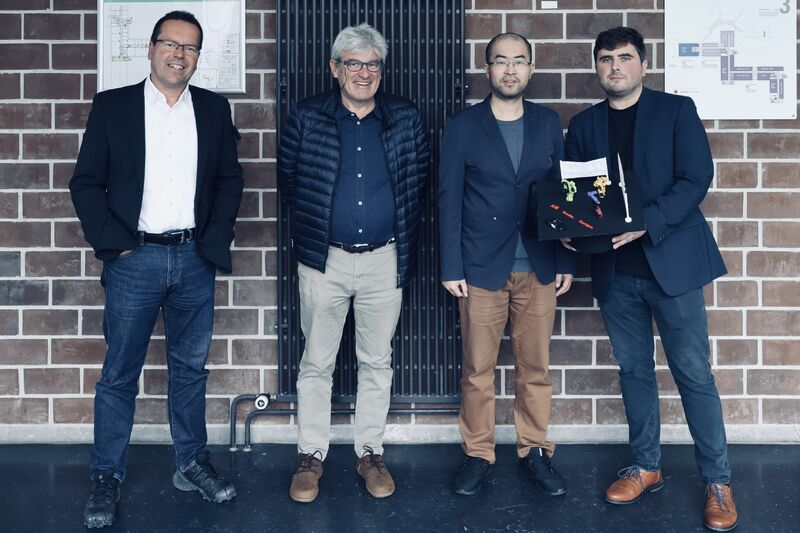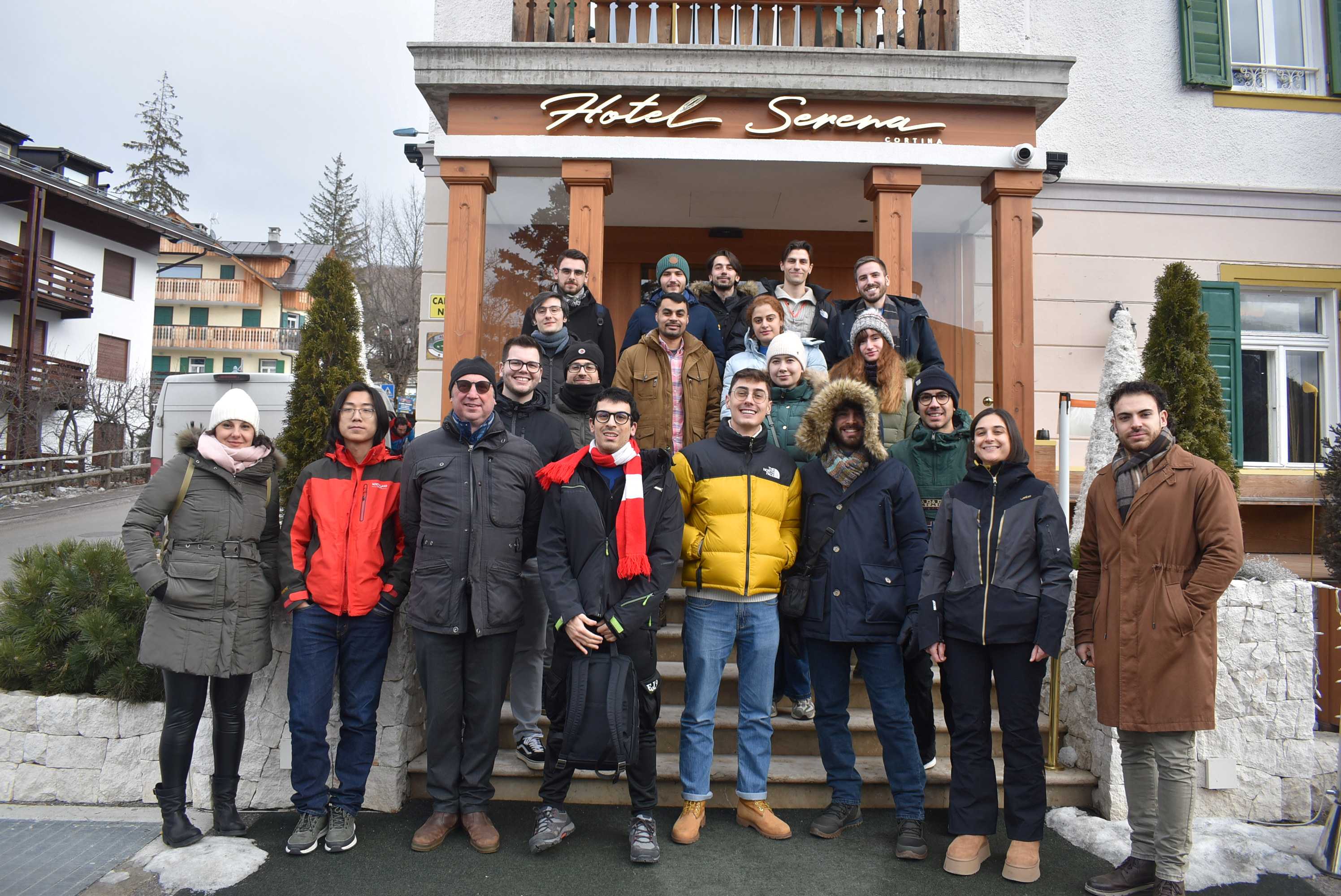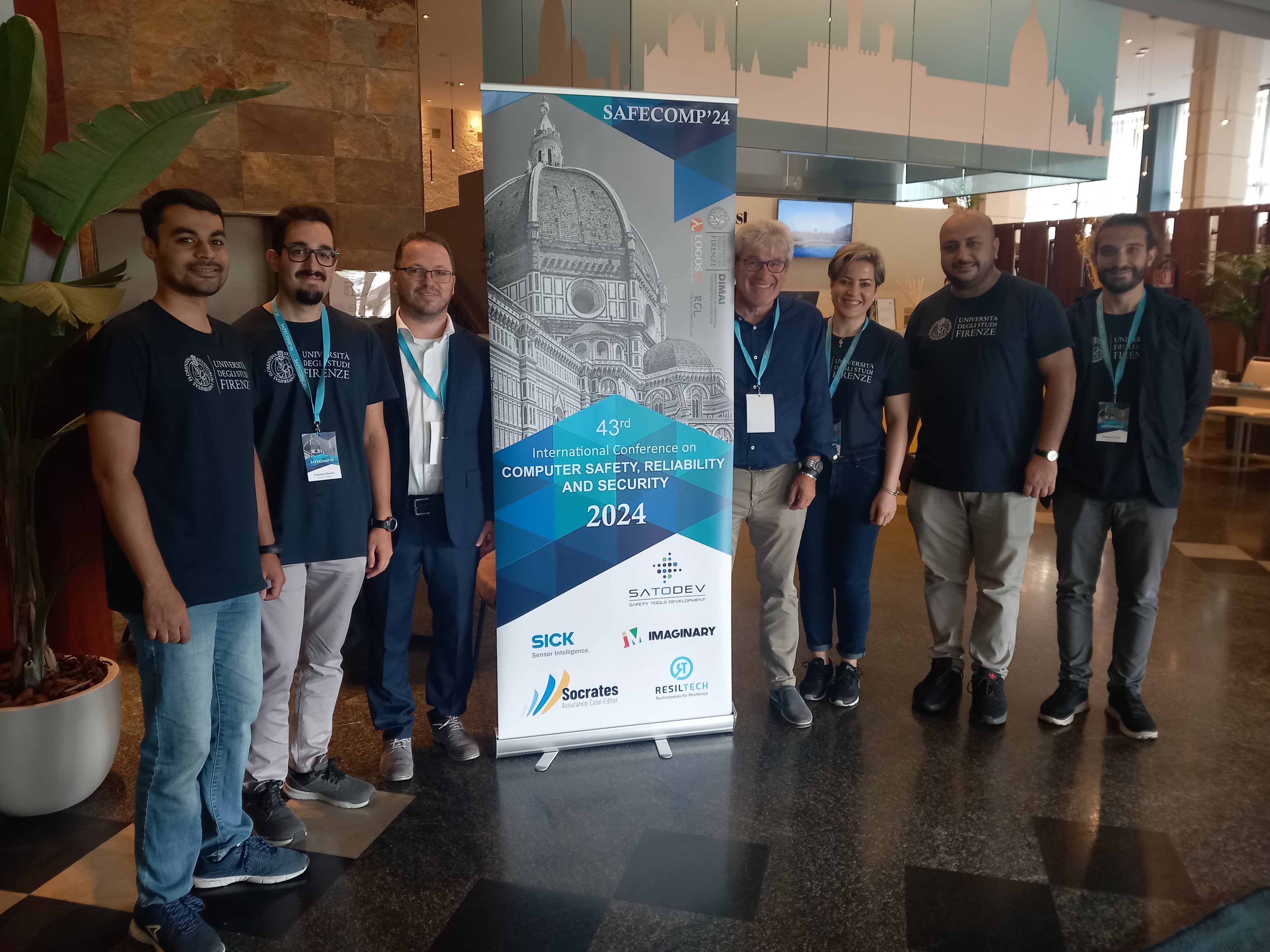Resilient Computing Lab
News
22 January 2026. Congratulations to Manuel Drago and Davide Zhang! Today, they received an award for the best Master and Bachelor Theses, respectively, in Computer Science at the University of Florence, Academic Year 2025-2026. The award was established by the Department of Mathematics and Informatics "Ulisse Dini".
Winter vacation period is approaching! Resilient Computing Lab wishes you Happy Holiday and Happy new Year. See you back in 2026!
7 October 2025 - Prof. Andrea Bondavalli participated in the PhD committee jury of Sheng Ding, who successfully defended his PhD thesis “Contributions to Dynamic AI-based Anomaly Detection of Complex Technical Systems”. His research presents a methodology for developing dynamic, adaptive, scalable, and AI-driven anomaly detection systems.

26-29 June - IFIP WG10.4 meeting in Ischia, Italy. Andrea Bondavalli and Andrea Ceccarelli attended the IFIP WG10.4 workshop on "Cybersecurity of Transportation Systems", with technical program organized by Andrea Ceccarelli, Marcus Volp, Wilfried Steiner. With presentations from NXP, TTTech Auto, Resiltech, Airbus, Collins Aerospace, NCC, University of Luxemburg, Hasso-Plattner-Institut für Digital Engineering, and lots of interesting dicussions.

7 May 2025 - WAU! poster is available. The project has produced its first deliverables and identification of the use case and it is progressing towards improvement of warehouse automation.
4 March 2025- Andrea Ceccarelli gave an invited talk (keynote speaker) at the 2nd Workshop on Automated Spatial and Temporal Anomaly Detection (ASTAD) @WACV 2025, Tucson, Arizona, with title "Anomaly-based intrusion detection: challenges and possible strategies from unknowns to APT detection". https://ismart.ece.mcgill.ca/wacv25/
13 February 2025 - RCL is co-organizing and technically sponsoring the 6th International Workshop on “Artificial Intelligence for RAILwayS” (AI4RAILS'25), co-located with the 20th European Dependable Computing Conference, 8-11 April 2025, Lisbon, Portugal (EDCC 2025). Topics of the workshop include AI for railway safety, reliability, maintainability, and security, adversarial challenges, explainable and trustworthy AI in railway applications, and certification challenges for autonomous trains.

5th February 2025 - RCL in Sao Paolo! Andrea Ceccarelli gave an invited lecture at Fatec - Faculdade de Tecnologia de Carapicuíba - Carapicuíba - São Paulo, titled “Anomaly-based intrusion detection: challenges and possible strategies from unknowns to APTs detection”.
See a short video!
20th January – 24th January 2025 - NECS – PhD Winter School 2025. RCL participated to the NECS winter school in Cortina d'Ampezzo. Andrea Bondavalli was one of the organizers, Andrea Ceccarelli one of the speakers, while Manuel Drago and Fahad Ahmed Khokhar were participants.


20 September 2024 - SafeComp 2024 successfully concluded! The RCL group hosted SafeComp this September; 4 days of workshops and conference with great talks and discussions!

27 March 2024 - SafeComp workshops have been announced and are open for submission! Deadlines are in May. See the details at: https://www.safecomp2024.unifi.it/
4 February 2024 - SafeComp deadline extended! The deadline of SafeComp 2024 has been extended. See details on the website https://www.safecomp2024.unifi.it/
29 January 2024 - New website open! New layout, new address, new life!
21 September 2024 - SafeComp 2024 in Florence! We are proud to announce that the 43rd International Conference on Computer Safety, Reliability and Security (SafeComp) will be in Florence, from 17 to 20 September 2024, chaired by Andrea Bondavalli and Andrea Ceccarelli. See the website: https://www.safecomp2024.unifi.it/
5 September 2023 - IWES 2023 concluded! IWES 2023 , chaired by Andrea Bondavalli, Andrea Ceccarelli, and Enrico Vicario, was successfully conducted in Florence, with 75 participants in two days. The active support of the Resilient Computing Lab has been the key to the success of the event.

17-20 July 2023. ARTISAN PhD Summer School (Role and effects of ARTificial Intelligence in Secure ApplicatioNs). The successful ARTISAN PhD Summer School 2023 took this year place in Vienna, Austria. The event, organized by AIT, University of Florence, and Grenoble INP – UGA brought together doctoral students, industry professionals, and researchers keen on exploring the versatile relationships between Artificial Intelligence (AI) and Machine Learning (ML) in safety- and security-critical systems. Over four enriching days, the ARTISAN Summer School brought together attendees from diverse backgrounds to examine the dynamic landscape of AI and ML in security and safety applications.
Thanks to the lecturers from academia and industry who addressed a wide range of topics, and engaged participants in thought-provoking discussions and practical sessions.

20 September 2022- Keynote at SRDS. The chair of RCL Group, Andrea Bondavalli, just finished his Keynote speech at The 41st International Symposium on Reliable Distributed Systems (SRDS 2022).
Title: Dependability Challenges in Safety-Critical Systems: the adoption of Machine learning
Abstract: Machine Learning components in safety-critical applications can perform some complex tasks that would be unfeasible otherwise. However, they are also a weak point concerning safety assurance. We will illustrate two specific cases where ML must be incorporated in SCS with much care. One is related to the interactions between machine-learning components and other non-ML components and how they evolve with training of the former. We argue that it is theoretically possible that learning by the Neural Network may reduce the effectiveness of error checkers or safety monitors, creating a major complication for safety assurance. An example on automated driving is shown. Among the results, we observed that indeed improving the Controller could make the Safety Monitor less effective; to a limit where a training increment makes the Controller's own behavior safer but results in the vehicle to be less safe. The other one regards ML algorithms that perform binary classification as error, intrusion or failure detectors. They can be used in SCS provided that their performance complies with SCS safety requirements. However, the performance analysis of MLs relies on metrics that were not developed with safety in mind and consequently may not provide meaningful evidence to decide whether to incorporate a ML into a SCS. We analyze the distribution of misclassifications and thus show how to better assess the adequacy of a given ML.
28 July 2022 - Keynote Speech at CSR. The chair of the group, Andrea Bondavalli, just finished his keynote speech at the IEEE CyberSecurity and Resilience Conference (CSR 2022)
Title: Intrusion Detection Through (Unsupervised) Machine Learning: Pros, Limitations and Workarounds
Abstract: It is undeniable that new cyber-attacks are continuously crafted against essentially any kind of system and service. Systems are subject to a mix of usual practiced attacks and new ones that were not previously known, motivating the need for building Intrusion Detectors (IDs) that can effectively deal with those zero-day attacks. Different studies have been devised Unsupervised Machine Learning (ML) algorithms belonging to different families as clustering, neural networks, density-based, neighbor-based, statistical, and classification. Those algorithms have the potential to detect even unknown threats thanks to a training phase that does not rely on labels in data. The talk shows how different algorithms are better suited for the detection of specific anomalies of system indicators, which manifest when attacks are conducted against a system. Unfortunately, those algorithms show inferior detection performance of known threats with respect to supervised ML algorithms; to fill this gap, we show improvements achieved when adopting Meta-Learning techniques. In any case, the quality of the best solution that can be devised depends strongly on the problem at hand and demands for high cost for selecting and finding the optimal set up of Unsupervised algorithms. To this end, we conclude the talk by proposing a cheap method to quantitatively understand the achievable results without exercising the full optimization activities.
24 July 2022 - New Award for Andrea! We just get to know that, On behalf of the IEEE Systems, Man, and Cybernetics (SMC) Technical Committee on Homeland Security (TCHS), and its award committee, Andrea Bondavalli has been granted with the:
*** IEEE TCHS Outstanding Leadership Award ***
This award recognizes an individual's outstanding leadership contributions to the homeland security community in general and to the field of cyber security and resilience in particular. The award recognizes the leadership and visionary contributions to the society at large through the promotion and applications of security and resilience concepts to a variety of technology, science, and business domains.
CONGRATULATIONS Andrea!
